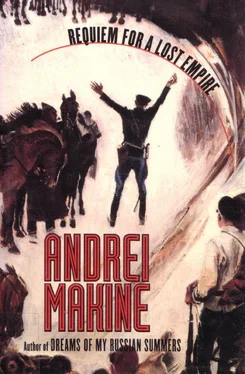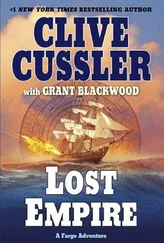He looked at them, then lifted his eyes higher, toward the slope rising up from the plain, where the first izbas of Dolshanka could be seen. And, as he did from time to time when plowing, saw the figure of Anna. She was standing there, motionless, the two pails placed at her feet. At this distance he was unable to discern the expression in her eyes and he knew that she could not but maintain her silence. But, more than any voice, more than the trembling of her eyelids that he could sense, it was the very air of that morning that suddenly diverted him from the moment he had lived through. The air was gray, light. The wind bore with it the humid sharpness of branches scarcely touched by greenery and the last resistance of the remaining snowdrifts hidden in the woods. Nikolai felt that the woman over there, his wife, Anna, and he at the other end of the plain, were linked by this air, by its pale light, the mark of a spring day, one of the springtimes in their lives.
The four men slowed down before accosting him, as if they were surrounding a wild beast ready to spring. For a second he thought he had forgotten their names and the purpose of their expedition. He was still far away, lost amid the suddenly awakened memory of all the springtimes, of all the snows, of all the dawns and all the nights he had lived through and seen with Anna. Especially that night on the banks of a river, beside a wood fire, on the road back from death.
He greeted the delegation of the activists with a tilt of his head. And made an effort to restrain a smile. Their extremely grave and worthy expressions contrasted with their boots, transformed into veritable elephants' feet by the clods of clay stuck to them. In place of the anger of the past months, Nikolai experienced only the irritation provoked by the stupidity of children at a difficult age, stupidity that is dangerous and impossible to avoid until "they get over it." Goldfish took a pace forward, looked behind him, to make sure that Batum was there, and launched into a carefully prepared tirade.
"So, bourgeois landowner, you don't read the newspapers, you treat the decisions of the soviet with contempt."
Here Krassny intervened, but in tones which formulated the condemnation rather better: "… and you continue to make use of property that belongs to the people. And you are not prepared to hand it over!"
Nikolai pretended to listen with an attentive and respectful air. And he spoke without abandoning this expression, even adding to it the look of an obtuse but well-meaning peasant.
"Hand it over to the soviet? But how could I hand it over? It would be the worst kind of fraud!" he exclaimed, with an air of offended honor.
The activists exchanged glances, disconcerted.
"Fraud, how's that? Now what do you mean by that?" the inspector exclaimed in amazement, his voice becoming increasingly loud and rasping.
"Well, take a look at this, Comrade Inspector!"
And profiting from the confusion, Nikolai grasped him by the elbow and led him toward the horse.
"Now, just take a look. Do you think it'd be honest to hand over to the kolkhoz a horse in a state like this? Have you seen these hooves? But how to get it shod? The last blacksmith we had was arrested by Comrade Batum two weeks ago. Yes, the blacksmith, Ivan Gutov. And look at that. That's not a plow, any more. It's scrap metal. And why? Because the screw for adjusting the plowshares broken. But as the forge is closed… I tell you, hand on heart, giving this to the kolkhoz would be worse than fraud. It'd be…" (Nikolai lowered his voice) "It'd be sabotage!"
It was the key word of the age, the conclusion of so many verdicts published in all the newspapers, the word Krassny was so fond of in his speeches. This time the three activists avoided the inspector's gaze. Batum, shifting his feet, was removing the mud from one boot with the other. Krassny cleared his throat. Goldfish licked his lips. Nikolai sighed and, without giving them time to react, announced in resigned tones, "But, after all, if Comrade Krassny decides it's better like that, there's nothing I can do. I'll bring the horse and the plow right away. Why delay? I'll come with you. And the secretary will give me a paper to say the kolkhoz accepts broken implements."
He leaned on the plow, lifting the plowshare, and urged the horse on. Goldfish nervously seized one of the reins.
"No, wait, you can go on plowing. Today…" he stammered and turned to seek the inspector's approval. Nikolai pretended to be outraged.
"How can I go on plowing? With a horse that's no longer mine? Do you take me for a thief? No, if it's decided, it's decided. I'll take it to the kolkhoz, I'll hand over the plow. Handed over, received, signed. This afternoon I'll bring the cart as well. Here, take the ax, for a start!"
Nikolai knew that the yard in front of the House of the Soviet was piled high with confiscated farm carts, furniture, piles of crockery. The rooms inside resembled the store for a great village bazaar. Goldfish stretched out his hand to take the ax, but withdrew it at once, as if to avoid a trap. The inspector had come to Dolshanka to see how, without losing face, they could calm down this mania for expropriation. It was he who resolved matters.
"Here's what we're going to do. I see, comrade, that you take the welfare of the kolkhoz to heart. A good deal more than some others" (he gave Goldfish a stern look). "I'm going to propose your candidature for the post of head of the collective stable. As for the blacksmith, I have a couple of words to say to Comrade Batum."
Nikolai resumed his work, plowing a furrow over the footsteps of the retreating activists. Goldfish and Batum were trying to convince the inspector, waving their arms and beating their chests.
Nikolai looked up toward the rim of the plain and saw Anna. She was walking slowly away beside the trees in the main street.
Next day, with the blacksmith released, they shod the horse. The peasants were returning from the House of the Soviet, their arms piled high with recovered crockery and tools. That night a long convoy, coming from neighboring villages, passed under their windows: a long spluttering of weary sobs, punctuated by the rumble of wheels and the clatter of horses. Whole families who would never be seen again.
Watching his son living and growing, Nikolai lost the habit of going back in his mind to the earlier world. For Pavel was happy. He marched along in the middle of a troop of children his age, sang songs in celebration of the brave revolutionaries, and even came home from school one day with a photo: his class, two rows standing and one sitting down, with the bugler and drummer on one knee in front of them, all proud to be wearing the red scarves of the pioneers, and behind them, on a broad strip of calico, these words painted in white letters: "Thank you, Comrade Stalin, for our happy childhood!" Talking to his son, Nikolai realized that there was some truth in this stupid inscription. The boy really believed that the Red Army was the finest and strongest in the world, that the workers of all countries aspired only to live like the people of Dolshanka, and that somewhere in Moscow there existed that mysterious Kremlin, surmounted with red stars, where the being dwelt who spent his days and nights thinking about every inhabitant of their immense country, who always made wise and just decisions, and unmasked enemies. Pavel also knew that his father was a hero, for he had fought against the Whites, those same Whites who had mutilated his mother. He detested the kulaks and, echoing the stories from his manuals, called them "bloodsuckers." One day, when leafing through his son's history book, Nikolai came upon the portrait of an army leader whom he had encountered during the civil war. The soldier's face had been carefully crossed out in ink. He had just been declared an "enemy of the people." Across the whole country, Nikolai reflected, in thousands and thousands of schools, millions of pupils were picking up their pens and, after a brief explanation from the teacher, blotting out these eyes, that brow, that mustache with waxed ends.
Читать дальше










